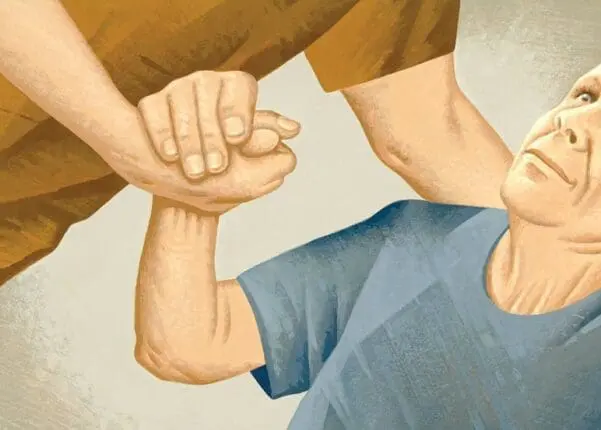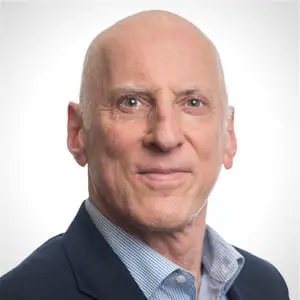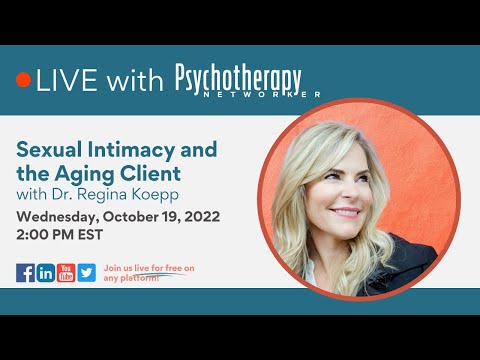A lot of blended families don’t really blend: the new “relatives” at first try to join together, but then they quietly distance themselves, however awkwardly, as differences and conflicts emerge, even as they try to pretend otherwise. My stepfather, Steve, and I made no such pretense—we were enemies from the start.
He entered my life when I was a cocky 16-year-old, about a year-and-a-half after the death of my own father from brain cancer. Steve was 45 at the time, and had already suffered a lifetime of tragedies, including the death of his mother when he was 6, 18 months of hard combat behind enemy lines in the Korean War, and the jolt of discovering his first wife in bed with another man. He was fixed up with my mother by mutual friends, latched onto her quickly, and held on tight, with no interest in dealing with her impudent children, especially the oldest son (me), who resembled the beloved husband for whom she still grieved.
I resented him from the moment I saw him. He was short and stocky; my dad had been tall. He was loud, opinionated, and boorish; my dad had taught me that only posers prattle on. He drank too much; my dad barely imbibed. For my mother’s sake, I spoke cordially to him, when I had to. But as we sidled past each other in the narrow hallways of the house, barely grunting acknowledgment, I saw an unwanted intruder with a hard, insolent stare. He saw a sneering, long-haired punk.
We might yet have found ways to bond. I loved riffing on my electric guitar, and he had a gifted musical ear, which allowed him to play any tune on the piano or banjo. He could fix anything, rewire the house, and put in new plumbing—skills I would’ve liked to have learned. But we remained caricatures to one another—usurping stepfather and disapproving stepson, Claudius and Hamlet. Even after I’d gone away to college and a productive adult life, tensions between us never eased. Greater distance helped us avoid overt conflict, nothing more.
On some level, I could see how my mother enjoyed caring for this moody, half-child man who could be both the joking, bragging life of the party and the needy, morose sulker in the corner. Steve worshipped her; she suckled him. When he turned 65 and insisted they retire and move to a South Florida gated community so he could play golf three times a week, she gave in, moving a thousand miles away from me and my growing family. To help him ward off his periodic depressions, she planned annual world excursions for them: Danube river cruise, African safari, Thai forest trek, Australian bush tour. For two decades, it seemed my most frequent communication with her was by postcard, with little contact with him. He was a curt voice on the phone before handing the receiver to my mom.
Then, as often happens when families enter the phase of late life, illness and reduced economic circumstances thrust us together to learn to relate differently. As he entered old age, Steve could no longer balance the checkbook, express himself intelligibly, or recall events. My mother long denied his progressing dementia—protectively speaking and remembering for him until eventually she took him to a neurologist for the dreaded diagnosis and futile meds. As his disease became worse and my mother became overwhelmed, I grew concerned about her health. Then she shocked me by calling me at work one day to ask me to send her $30,000 immediately to pay off debts. I’d been clueless that they’d lived too high for too long; their posh Florida condo and those exotic trips had cost them. Instead, I persuaded her to file for bankruptcy and, at my wife’s suggestion, for the two of them to move back up North to live in an apartment a mile from our Pennsylvania home so that we were near enough to help. We were now going to be a caregiving family.
I approached this change anxiously. We hadn’t lived in the same city for more than 25 years and didn’t know each other well. Even though what I knew of Steve I didn’t like, I still had the sense that caring for frail older adults was the right thing to do. I wanted my teenage children to learn that family value and I thought I owed my mother my help. Besides, having already written a book on caring for aging parents, I found it impossible to turn away from the challenge in real life.
The Steve who stepped off the plane in Philadelphia from Florida was a shrunken, weaker version of the man I first met. His face was still cast in a mask of mild disdain, but his eyes now darted about uncertainly. As he walked, he shambled and swayed. On that first night, he tripped on the front step on the way into my house, hitting the paved walkway hard and ripping deep gashes in his thin, bony elbow and shin. As I quickly picked him up under his arms and propped him back on his feet, I could feel his ribs and how emaciated he’d become. He was light as a child. For the first time in my life, I had a feeling of sympathy for him, even admiration. He didn’t complain about pain or gape at his profusely bleeding wounds. While literally in the hands of his hated stepson and unable to hide his vulnerability, he still tried to maintain his dignity by keeping calm and holding his head up.
Life over the next year became organized by caregiving routines. My wife and I provided dinner for them three times a week, drove them to doctors’ appointments, picked up groceries. My mother fussed over and comforted Steve. Because he was no longer capable of stringing more than a few words together, Steve and I didn’t talk any more than we ever had, but his steady decline also peeled back his personality’s defenses—the Korean War vet gruffness, the smirks and condescension—exposing a raw, elemental openness. As I straightened up around their apartment or prepared lunch, I’d catch him watching me intently from his armchair with the wide-eyed, beseeching look of a curious 3-year-old. When I’d speak to him directly, he’d now smile back at me broadly with the rapt ardor of a puppy dog obeying the alpha male in a way I found both astonishing and disconcerting. The poles of our relationship had become unmoored. leaving me unsure whether this radical change was just an artifact of dementia or genuine gratitude.
Then things went rapidly downhill. Steve began wandering about the apartment at night in confusion while my mother slept too deeply. On several nights, he got out his toolkit and tinkered. One morning my mother woke to find he’d disconnected the faucets from the sinks and removed the metal protective plates from the electrical outlets. She feared he’d do something even more dangerous without 24-hour supervision. Though anguished and guilty, she decided to place him in a local nursing home.
I had mixed feelings about this. The part of me that was still invested in hating him thought, Just desserts. The bastard had it coming for a long time. But another part of me was softening toward him, wondering what this terrible diminishment must be like for him and what was going on in his failing mind. He’d lost so much in his life, then gained stability and comfort with my mother, only to now lose that, too. On my many visits to the nursing home, I’d watch him sitting at a table in the crowded and noisy day room of the dementia unit, staring blankly, getting thinner and more fog-bound with each passing month. His face—gaunt and impassive with numerous red sores and flaking skin—now prevented me from discerning his thoughts or emotions. To my surprise, that frustrated me. I couldn’t easily dismiss him as my damn stepdad; I felt sorry for him.
About two years after he’d moved to the nursing home, Steve died of sepsis due to bed sores. It was ironic to me that, of all the people in his 81 years of life, it was left to me, his most distant relation, to organize his funeral. On a hot July day, I led a group of 20 family members and friends on foot from the cemetery reception area to the plot where his ashes were to be buried. One by one, cousins and nieces stood at his graveside and told stories of how caring he was, how sensitive and attentive, how his humor lightened their lives. I stayed off to the side, feeling as wooden and hollow as the small, polished box of his cremains that I tightly held. Who was this man they were talking about? I didn’t know.
In the three years since, I can’t say I’ve actually grieved for Steve with any sadness or longing. Still, there’s a gnawing sense of having missed something important to my own identity. I’ve realized that for most of my adult life, I’ve thought of him as my foil, my anti-mentor, without really knowing the person against whom I pushed.
In the front closet in my mother’s apartment, I came across two dozen large photo albums of their exotic and expensive trips and began taking them down, one by one, to look at pictures of the life on the road he’d most enjoyed. In some, he looked young and virile and handsome—a good athlete, as my own father had been. In others, he beamed from some English castle tower, or struck a gallant pose on the Great Wall of China, or held my mother’s hand tenderly in some Italian square. I discovered that he was both well-organized and sentimental. The photos were put into the albums with great care and with labels of time and place handwritten in a steady, neat print. In some of the albums, I found he’d included trip diaries with enthusiastic and detailed descriptions he’d written of restaurants where they’d dined, sights they’d seen, and traveling American couples they’d befriended. These albums held no evidence of the aloof and disdainful man I’d experienced. Instead, here resided a big-hearted lover of life.
To my great surprise, the albums also included many photos of me and my wife and children at various places and times. They had the same neat labeling and care. Had he taken secret enjoyment in being with us, too?
So for nearly four decades, Steve and I knew—or didn’t know—each other, never advancing beyond the adversarial roles into which we first fell. Yes, I was and am the loyal protector of my father’s memory. But couldn’t I have still broken the ice with my stepfather? Why didn’t he? It’s only now, as the resentments that fueled our disconnection fade into the past, that I find myself embracing the process of trying to understand him and acknowledging the part of myself forever intertwined with him.
Illustration © Adam Niklewicz
Barry Jacobs
Barry J. Jacobs, Psy.D. is a Philly area-based clinical psychologist, healthcare consultant, and coauthor (with his wife, Julia L. Mayer, Psy.D.) of AARP Meditations for Caregivers (Da Capo, 2016) and AARP Love and Meaning After 50 (Hachette, 2020). He writes a monthly self-help column for family caregivers on AARP.org.












